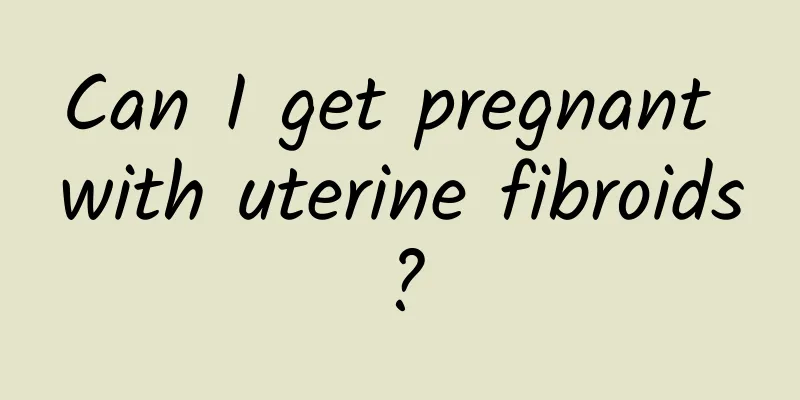Can I get pregnant with uterine fibroids?

|
It is possible to get pregnant with uterine fibroids, but there are some things to note. Uterine fibroids are a common gynecological disease. Although in most cases it will not affect pregnancy and fertility, the specific situation varies from person to person. 1. Types and locations of uterine fibroids: Uterine fibroids can be divided into submucosal fibroids, intramural fibroids and subserosal fibroids according to their location. Submucosal fibroids are located under the endometrium and are likely to affect conception and pregnancy; intramural fibroids grow in the myometrium and may have a certain impact on pregnancy; subserosal fibroids grow on the outer wall of the uterus and have relatively little impact on pregnancy. 2. The impact of fibroid size on pregnancy: The size of fibroids can also affect pregnancy. Fibroids smaller than 5 cm usually do not have a significant impact on pregnancy, while fibroids larger than 5 cm may compress the uterine cavity and affect the implantation and development of the embryo. In addition, larger fibroids may cause uterine deformation and increase the risk of miscarriage and premature birth. 3. Symptoms and treatment options: If fibroids cause obvious symptoms, such as irregular menstruation, abdominal pain, anemia, etc., it is recommended to be treated before pregnancy. Treatment methods include medication and surgery. Medication can temporarily relieve symptoms, but it cannot cure fibroids; surgical treatment includes myomectomy and hysterectomy. The former preserves the uterus and is suitable for women who want to have children. 4. Monitoring during pregnancy: After pregnancy, if there are uterine fibroids, regular prenatal examinations are required to monitor the growth of the fibroids and their impact on pregnancy. The doctor may recommend an ultrasound examination to assess the size and location of the fibroids and ensure the normal development of the fetus. 5. Lifestyle adjustment: Maintaining a healthy lifestyle is particularly important for women with uterine fibroids. A balanced diet rich in vitamins and minerals can help strengthen the body; moderate exercise, maintaining a good attitude, and reducing stress can help increase the conception rate and pregnancy success rate. 6. Communicate with your doctor: Women with uterine fibroids should fully communicate with their obstetricians and gynecologists before planning pregnancy to understand their specific situation and possible risks. The doctor will provide personalized advice and treatment plans based on the type, size and location of the fibroids. In general, women with uterine fibroids can get pregnant, but they need to take appropriate measures according to the specific situation. With reasonable treatment and monitoring, the vast majority of women can successfully become pregnant and give birth to healthy babies. I hope this article can provide you with valuable information to help you better understand and deal with issues related to uterine fibroids and pregnancy. |
<<: Can mild cervical erosion heal itself?
>>: Can eating durian relieve dysmenorrhea?
Recommend
How long should I rest after a miscarriage?
It is usually necessary to rest for 14 days after...
What are the symptoms of endometriosis that require treatment?
Typical symptoms of endometriosis include dysmeno...
No plastic surgery required! Fight sagging buttocks with these 5 tricks
No plastic surgery required, these exercises desi...
The following are some surgical methods for painless abortion
Painless abortion is a common abortion method in ...
Will endometrial polyps increase in number?
Will endometrial polyps increase in number? Endom...
Experts suggest that the treatment of cervical erosion is very important
Many people want to know the treatment methods fo...
The most important care for pelvic inflammatory disease
Among gynecological diseases, pelvic inflammatory...
What is the reason for the recurrence of vaginitis?
Vaginitis brings a lot of troubles to women, espe...
What are the factors for recurrence of pelvic peritonitis?
Pelvic peritonitis refers to inflammation of the ...
Clinical symptoms of cervical precancerous lesions
What are the clinical symptoms of cervical precan...
What to do if you have menstrual disorders after miscarriage?
What to do if you have menstrual disorders after ...
What tests should be done before artificial abortion
What tests should be done before artificial abort...
What ointment to use for vulvar leukoplakia
Vulvar leukoplakia is a common gynecological dise...
Why is my belly bloated after uterine fibroid surgery? My belly got bigger after uterine fibroid surgery.
Why is my belly bloated after uterine fibroid sur...
What is the cause of dysmenorrhea and what should I do?
What is the cause of dysmenorrhea and what should...









